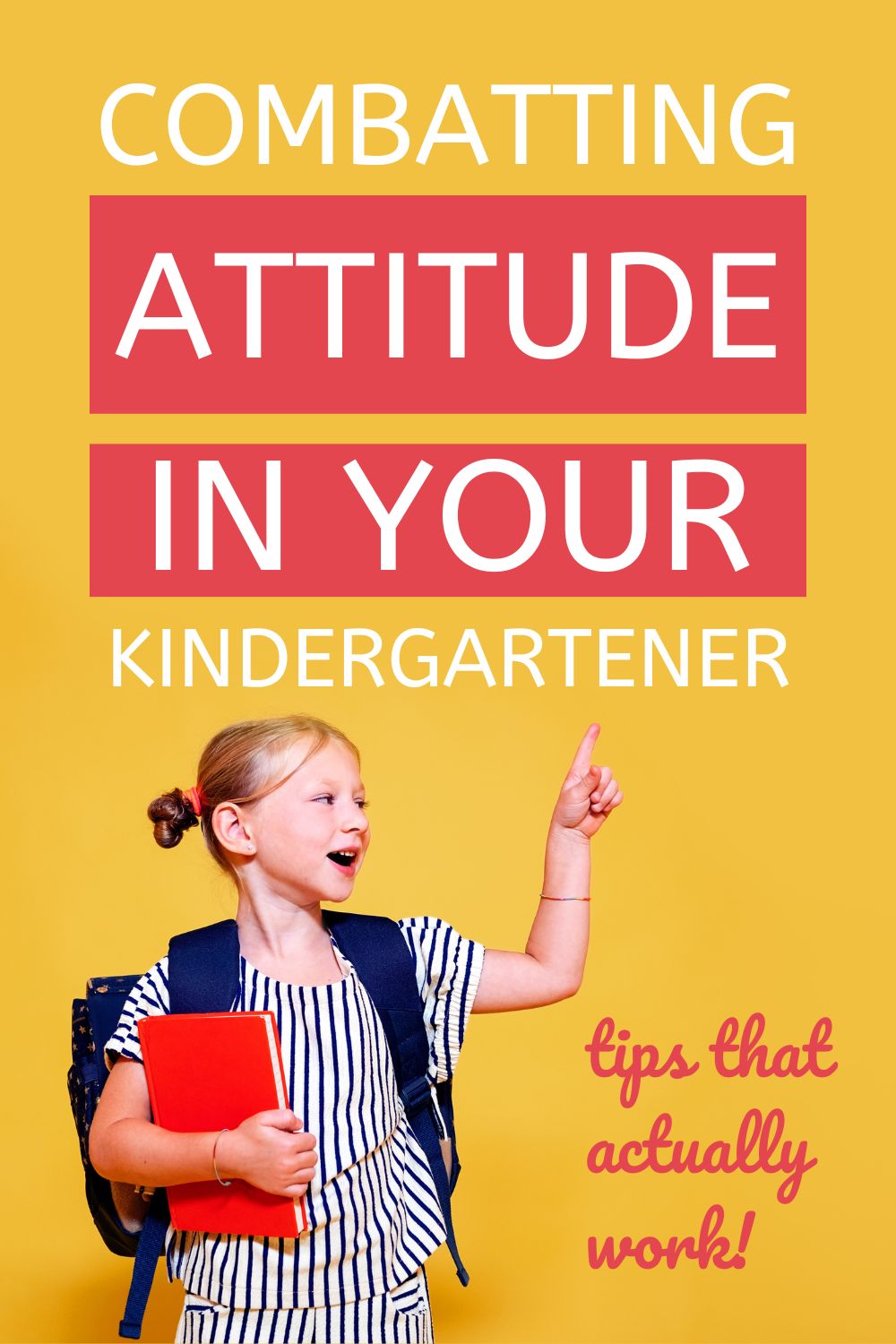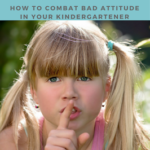It is very typical for a kindergartener to start to get an attitude at home. Learn what Kindertude is, why it happens, and what you can do to help mitigate this attitude at home.

It can be quite a shock. You send your sweet little angel off to kindergarten and get back a combative sassy child.
What is going on? Why is this going on? How do you stop it?
Post Contents
Kindertude
Don’t worry. Take a deep breath. This is actually normal and I call it “kindertude.”
What is Kindertude? It is a word I made up to define the attitude a Kindergartner gets when he/she starts school.
I remember when Brayden was a one year old and many of my friends had children starting Kindergarten. I remember them talking about the attitude that crept up.
Flash forward to when Brayden started Kindergarten. Pretty quickly, he started an attitude. It was an attitude that seemed to be saying, “I have now realized that I can be independent of the home. I have also realized I am pretty smart, and that there are other smart people besides you, mom and dad.”
I recalled those days when Brayden was young and consulted with my friends with older children. Was this normal? Did you see this happening with your child?
I got a response 100% in the affirmative.
I don’t remember exactly when he snapped out of it, but I do know that by first grade, it was gone. I think maybe first grade is a bit more humbling. Kindergartners are more protected from the big kids of the school (at least with half-day kindergarten that my kids had). In first grade, they eat lunch with the big kids, have recess with the big kids, and all around realize they aren’t so big after all.
>>>Read: 15 Things Your Child Needs to Know Before Kindergarten
Now let’s flash forward to Kaitlyn.
Her Kindertude was more magnified than Brayden’s. Her Kindertude extended into being very impatient at times with younger siblings (ahem, McKenna) at home.
Not only did she have the “I am so smart” thing going on, but she put more pressure on herself to be perfectly behaved.
Kaitlyn was also very aware of proper social manners, where Brayden was pretty oblivious, and I think it is exhausting for her to be so “on” for school. So far as I am aware, Kaitlyn didn’t made one social mistake at school. She was on her best behavior at all times. Her teacher was always telling me how great she is, helpful she is, good she is…I think she just got tired and couldn’t keep it up at home.
McKenna, my third child, didn’t seem to have a lot of Kindertude, but she was what we call a strong-willed child. So I was used to having a battle with her. I did feel like she seemed to hit a Kindertude in first grade rather than Kindergarten.
When Brinley, my fourth child, hit Kindergarten, she also had some Kindertude. It didn’t really phase me. I felt like it wasn’t as intense with her as it had been with my other kids, but I did acknowledge that it might have just been that she was my fourth and it didn’t seem like that big of a deal. Plus by then, I had older kids who were in or just getting through tween years, so the attitude of a kindergartner just didn’t seem like a major problem.
She was harder when siblings were around, so maybe it was overall not a problem because she was often just Brinley and me.
Why Do Kids Get a Kindertude?
So why does Kindertude happen? I don’t know exactly, but I can give some ideas:
- The age of the child. Here is an interesting thing. Neither Brayden nor Kaitlyn had this issue in preschool. Both went to preschool three days a week for several hours each day and never picked up the “kindertude.” So I think part of this must be caused by it being an age thing. In other words, it is partially developmental.
- Their world expands. Your child realizes there is a big world outside the home. Her world is expanding and she is figuring out how to manage all of that in her head.
- Struggling with growing up. Your child is starting to grow up, but still wrestling with the desire to just be a kid. She wants to be more grown up, but wants to be (and IS) a kid. The good side of this transition is your child will learn to be more responsible and will be more responsible at home if you encourage, comment on, and thank for that behavior.
- Outside influence. There are always those things kids can pick up from other kids. My children didn’t come home from school with a major issue they had picked up. They were small things. I took it as an opportunity to reinforce what they have learned in the home and to teach the importance of “right is right even if no one else is doing it.”
- Feeling “wise in her own eyes.” Your child might feel like a big girl now that she does this all-important thing of leaving the house each day.
>>>Read: Wise In Your Own Eyes Explained
What To Do About Kindertude
Despite the fact that getting a little attitude when starting school can be typical, you don’t want to just let it be. You want to help your child work to overcome this attitude.
What can you do about it?
- Have some patience. To an extent, this is normal for the age. That doesn’t mean you let her talk back to you or be grumpy at home. It just means you don’t take it personally and don’t freak out that your child is morphing into something negative.
- Maintain structure at home. Still have independent playtime when able, rest time when able, and chores each day. Keep a routine at home.
- Have free play. In your routine, make time for creative and free play. Your child will most likely not have a lot of play at school, so make sure you have that in her day so she is well-balanced.
- Encourage childhood. Keep your expectations of your child appropriate for her age. Remember the funnel. Keep her in her funnel. Make sure she knows you are okay with her being a child right now.
- Strengthen character. Teach her well at home so she is less inclined to pick up on bad habits. When she does, gently remind her of appropriate behavior.
- Talk to her about her day. Spend some time with her each day when she comes home (or as soon as you can after she comes home) talking about what she did and how she felt. Many times, children are more willing to talk if they are doing another activity, like folding laundry, washing dishes, baking cookies, coloring, etc. It is less intimidating than sitting and being stared down by a parent. Read more about that here: Triad Communication {Getting Kids to Talk}
- Correct your child when needed. Remind your child when her behavior is not okay. Be compassionate, “I know you are very tired from being at school, but you do not get to treat your sister that way.” Remember to be positive, directive, and to use the virtue rather than the vice. Here are some related posts: Teach What is Right, Not Just What is Wrong, Instill Morality and Behavior Will Follow, and The Golden Rule (and the Platinum Rule).
Conclusion
Your child will not keep the Kindertude forever. As she gets older, realizes she isn’t so “big” after all, and as you guide her through it, she will get back to her normal self.
Related Posts
- 18 Healthy Snacks for After School for Your Kids
- The Ultimate Back to School List
- Traditions for the First Day of School Your Children Will Love
- Why We Chose To Send Our Daughter to Kindergarten On Time
- Is a Public School Right for Your Child?
- Simple Penmanship Preparation for Future Kindergartners
- Getting Preschoolers Ready for Kindergarten

This post originally appeared on this blog in February 2013

